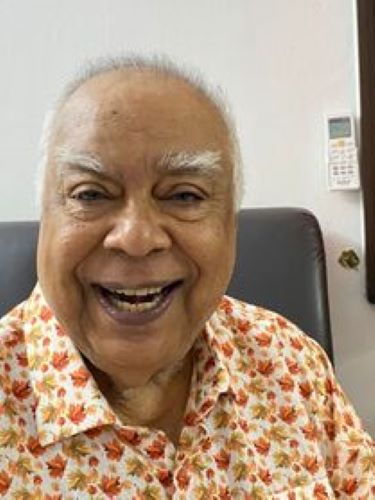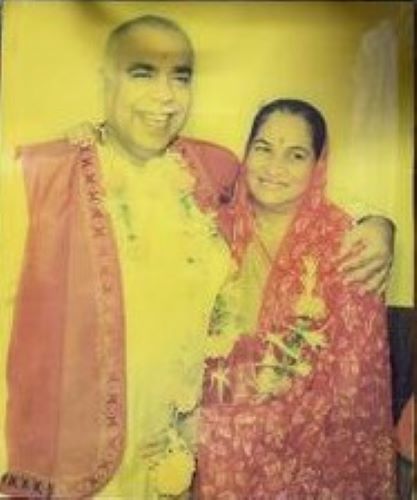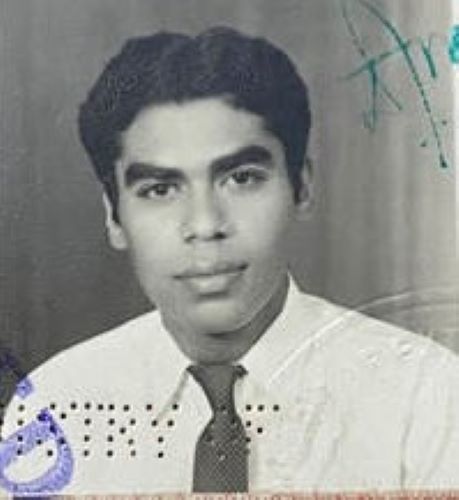
Pami’s father had his own business, which dealt in trading goods, while his mother was a housewife. The family had a haveli in Sann
Partition Stories from the Province of Sindh
Parmanand (Pami) D. Adnani was born on 5th October 1939 in Sann, Dadu district, Sindh, British India (Pakistan today).
For a long time after Partition, his family held on to the hope that they would return to their village – hopes that were eventually put away.
Today, he lives in Kuala Lumpur, Malaysia and this is his story.

Pami D. Adnani was born to Devandas and Tillibai Adnani, in a family of two sons and five daughters. For generations, the Adnani family have been well respected, with Pami’s grandfather even being appointed as a Mukhi (village head of the Sindhi community)
His father had his own business, which dealt in trading goods, while his mother was a housewife. The family stayed in a haveli (a sort of single story linked houses, without a partition between the houses, that center around a courtyard), which had six other houses that were home to his chachas (father’s brothers) and his cousins. His father’s business was located in Karachi, a slight distance away from Sann. This meant that his father often remained in Karachi, away from the family. His family were well-to-do and life was comfortable and happy, surrounded by their loved ones.
He recalls celebrating four key festivals – Diwali, Sathai, Holi and Chand (new moon). All celebrations took place within the community, with the exception of the Chand festival that took place at a Sindhi temple, called Shewaloo, at their village.
The family left for Karachi from Sann via train. As they were departing, Pami says that the Sindhi Muslims in their community shed tears, saddened to see their fellow villagers leaving
At the time of Partition, Pami was eight years old. He vaguely recalls there being some disturbances in his village once Partition was announced. However, what he vividly recalls is being woken up in the middle of the night by his mother. He realized that something was amiss when he saw that his chachas were at their home at this time of the night. They advised the family to be ready to leave at a moment’s notice for Karachi. Thus, the family packed up their clothes and jewelry, but had to leave everything else behind. It was a sad night, Pami says, especially for his mother and uncles who he saw were crying and in distress.
The family left for Karachi from Sann via train. As they were departing, Pami says that the Sindhi Muslims in their community shed tears, saddened to see their fellow villagers leaving.
Sadly, upon arriving in Karachi, mobs descended upon the station and robbed the families in transit there. Pami’s family lost their jewelry and only managed to get away with the clothes they had packed. From the station, they were taken to a camp where they remained for two days. Pami’s father, who had remained in Karachi for his business, now met the family at the camp and took them to a house.
Upon arriving in Karachi, mobs descended upon the station and robbed the families in transit there. Pami’s family lost their jewelry and only managed to get away with the clothes they had packed
Before they left Sann, the village head, who was a close family friend, had bought tickets for Pami and his family to board a ship to Bombay (Mumbai today) from Karachi. After a week at the house in Karachi, the family used the tickets to board the SS Barjora, headed for Bombay. Pami’s father once again remained in Karachi to keep his business going because he was still holding on to the hope that the family would one day return to the place they had called home to this day.
Pami estimates that there were 1,000 people on board the ship. Upon arriving at the port in Bombay, they were brought to a camp (Asvali) in Nashik. His family was to remain here for six months, before being transferred to another camp in Ahmedabad, where they stayed for four months.

After spending ten months in camps, the family then moved to Agra. Unfortunately, after some time, Pami’s father passed away in Agra. Pami was only 12 years old. One of his maternal uncles, who was staying in Mhow, knew that the family were in dire need and decided to bring the family to Mhow, Indore.
Once they settled in India, Pami completed his schooling and graduated with honors. He and his brother became the sole breadwinners at a young age, to support the whole family.
After graduating, in 1960, Pami joined his brother in Malaysia to work, where he and his brother continued to support his mother and sisters back in India. He got married in Malaysia in 1961.
When asked to reflect on his thoughts at the time of Partition, Pami candidly says that he knew they would ‘suffer a lot’. This was mainly because of the condition of the camps and having to restart their lives in a place where they did not know anyone. Additionally, he also recalls that when the family reached India, they were called refugees as they were stateless, and that was really painful for him to comprehend. However, the bonds that they had forged in their village of Sann remained – about 15-20 years ago, he says that the village head came to visit him in Malaysia!
Today, Pami continues to live in Kuala Lumpur, Malaysia and has four children.
________________
Courtesy: Stories of Sindh (Posted on January 31, 2022)